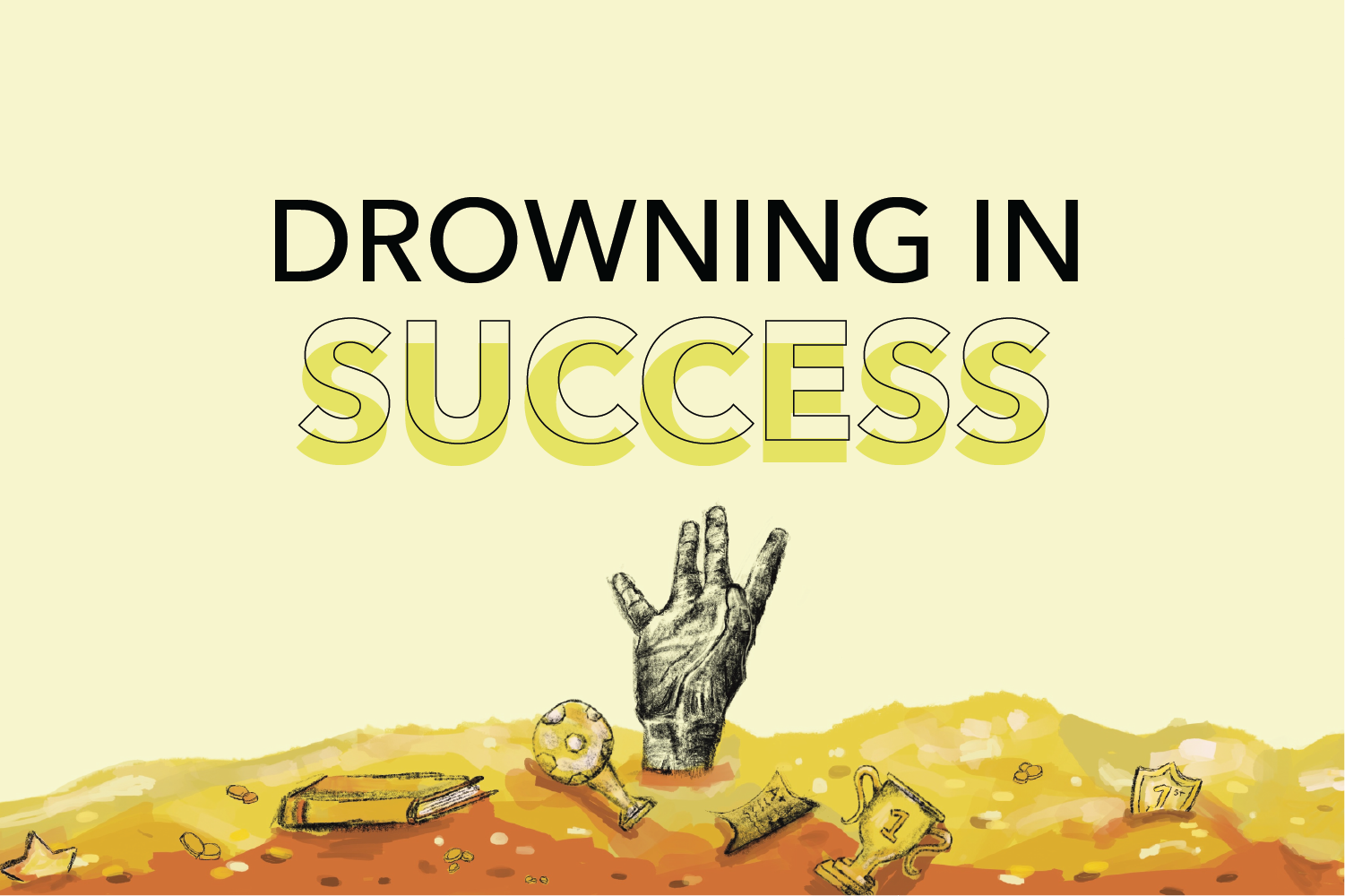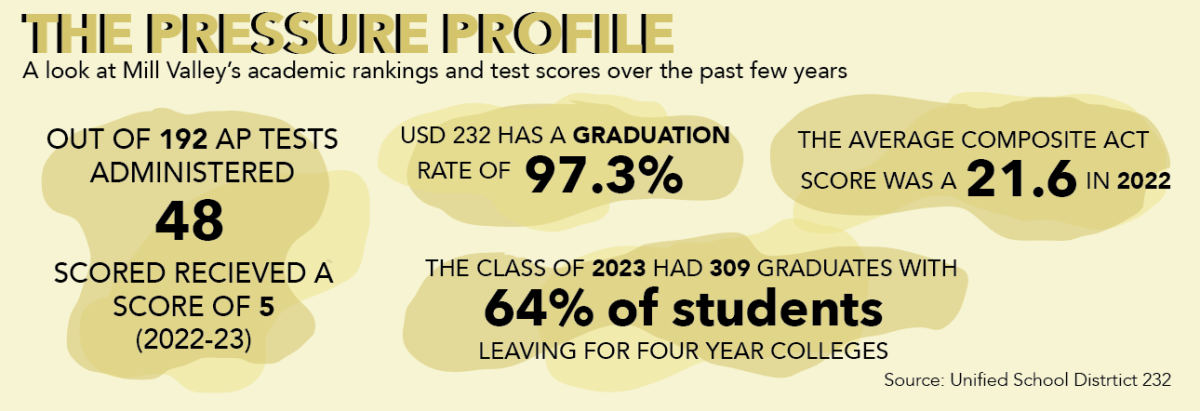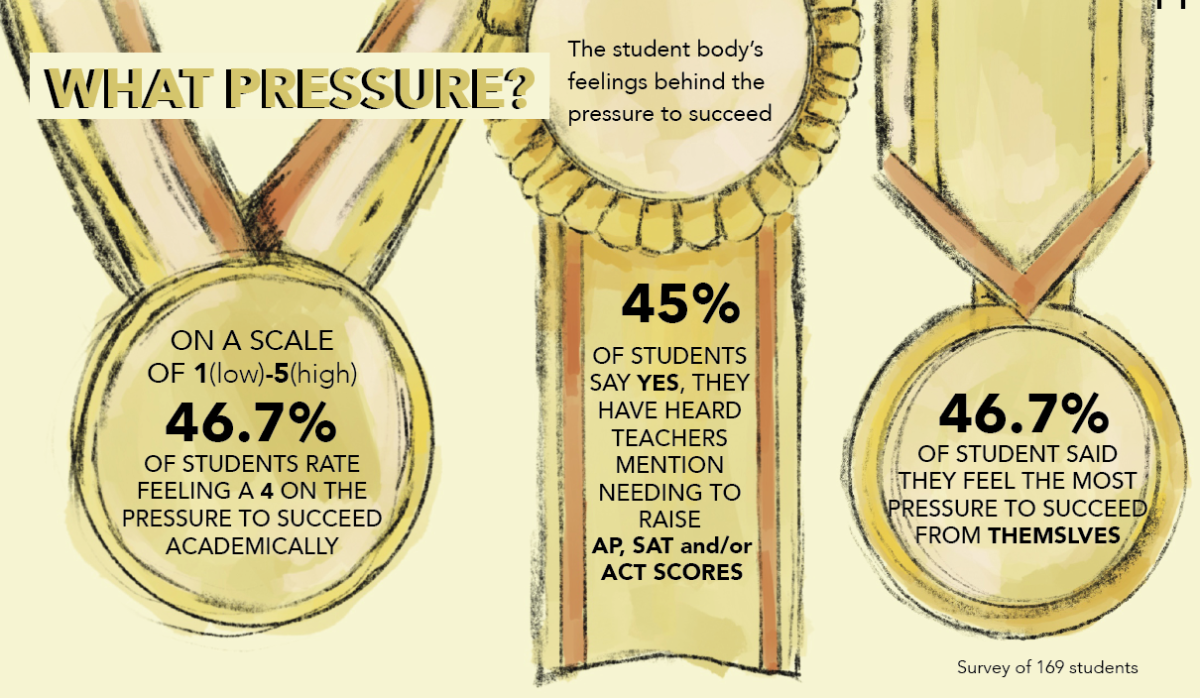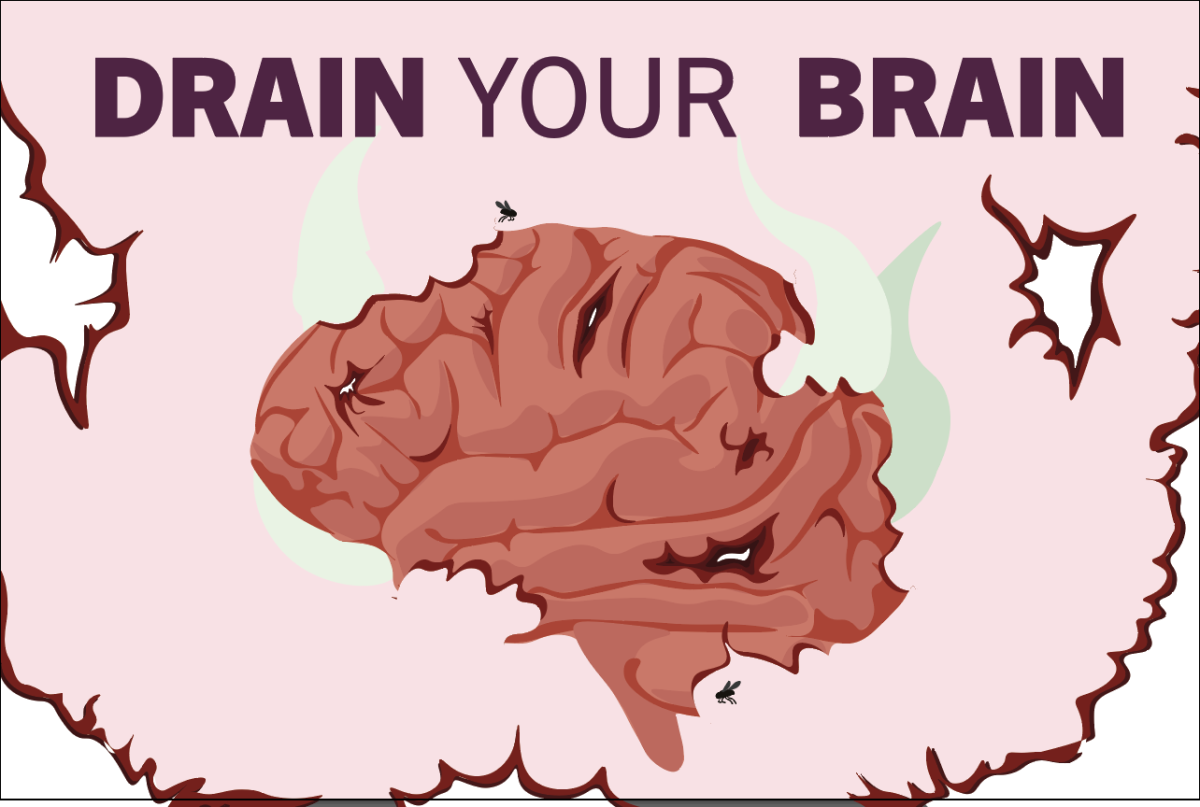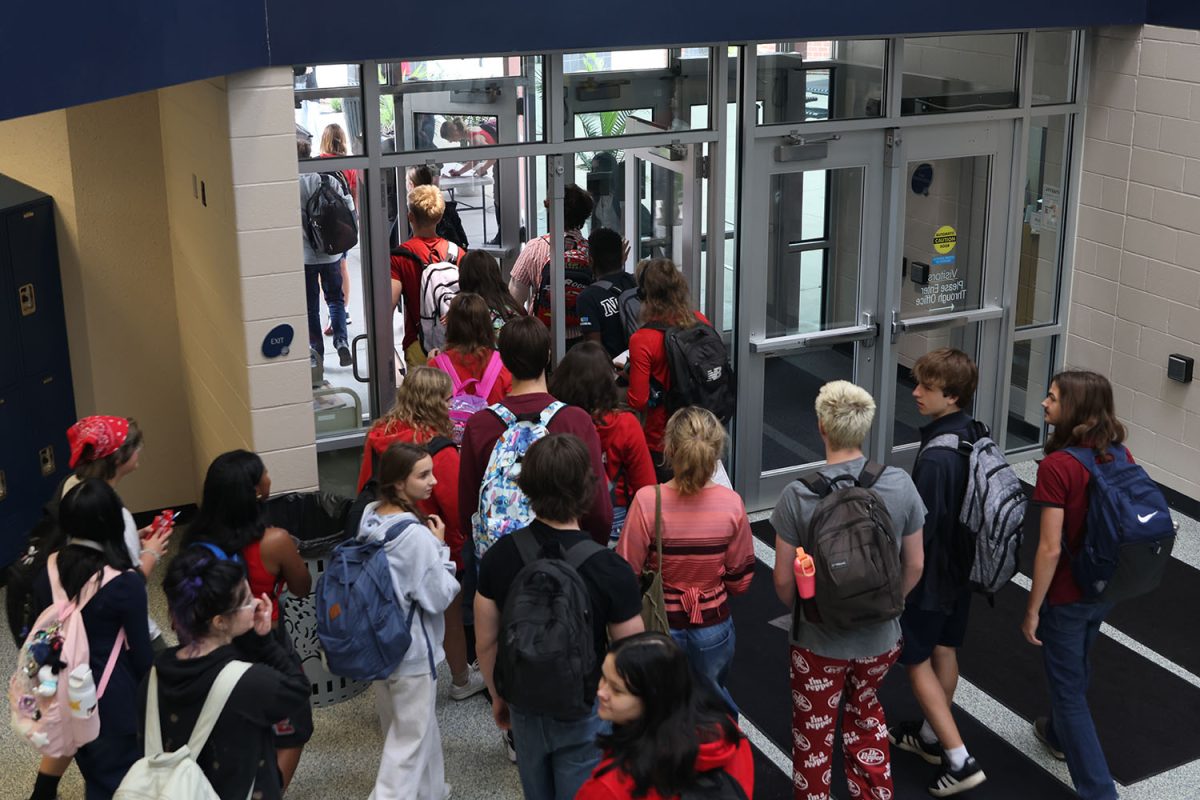Students and teachers explore how the success culture of the school affects performance
Mill Valley has award-winning academics, a three-time national champion dance team, impressive test scores, a state winning football team of four consecutive years, successful students, competitive activities, difficult classes and everybody knows it. The school is a place of excellence, of high-achieving students and the staff that helped them get there. However, with a seemingly never-ending legacy of success, those that must follow these feats find themselves wondering how they can possibly measure up, fearing that they will come up short. The JagWire newspaper explores how the ‘pressure cooker’ environment of Mill Valley manifests and how to start cooling down.
There are many sources of pressure coming at students as they go about their daily lives. Whether it be from family, teachers, peers or themselves, this pressure’s existence is almost a guarantee at Mill Valley. This pressure not only affects students physically in their sports and activities, but also mentally with their academics and mental health.
For freshman Graham Anderson, this pressure is often exacerbated by his two academically successful sisters, class of 2022 graduate, Summer Anderson and senior Sarah Anderson. He explains how this affected the difficulty of his courses this year.
“I felt a little bit of pressure from my family to make sure that I was taking the hardest classes that I could and the best classes, but my teachers were pretty supportive of whatever I wanted,” Anderson said.
Similarly, sophomore Preslie Wampler, who is one of five siblings, often feels she needs to both live up to her older sister, senior Halle Wampler, and set a good example for her younger sisters in terms of both school and dance.
“She’s the [dance team] captain, and she has been for three years, and I want to become a captain next year,” Wampler said. “I want to [be able to] do whatever she does with the dance and everything and that takes a lot of time.”
Sophomore Heidi Baillos also faces pressure specifically from her father to succeed in her sport. Baillos’ father is one of her tennis coaches which creates a complicated source of stress for her.
“I mean, [my coaches] don’t really pressure me, but my dad’s a coach and he’s always been very keen on winning.” Baillos said.
Aside from familial pressure, some students feel their biggest critic is themselves. Senior Wil Lehan expresses this sentiment.
“I would say a large amount of the pressure comes from myself, wanting to be the best person I can be and achieve my goals [and] get to college and the programs I want,” Lehan said.
However, students are not the only people at school who feel like they constantly need to succeed. Chemistry teacher Jill Lloyd shares that even teachers can feel pressure to help their students raise test standardized scores. Additionally Lloyd explains that pressure stems from competition as a district for success.
“I think the pressure is multifaceted,” Lloyd said. “As a teacher you know your students are outstanding. You want the public to see that as well and a standardized test is accepted maybe for all of the patrons including state or national. I feel it as a district, even competing from year to year.”
Furthermore honors and AP classes can be sources of pressure in and of themselves, even without busy schedules and difficult tests.
“More pressure is held at the beginning of the year and more pressure is probably felt during the junior year with the honors classes,” Lloyd said. “I think the kids see value in themselves as high performers and when they don’t perform highly they feel like their value is being judged.”
While the standardized test scores Lloyd mentioned are one way this pressure manifests, there are many other manifestations of pressure that students face regularly.
For Lehan, the need to constantly live up to the accomplishments of an older sibling can greatly affect a person. Lehan has three older siblings who were all successful at Mill Valley, but his brother John Lehan was who he most felt he needed to live up to.
“In the past that affected me quite a lot,” Lehan said. “My brother is a big inspiration for me. He’s a very talented individual, especially when it comes to school and learning, so I definitely felt pressure in the past to match what he was doing when he was at Mill Valley.”
When coupled with a sport, this pressure only increases. Baillos finds her long days of both schoolwork and tennis can make her exhausted from the balancing act.
“I end up coming home from school exhausted,” Baillos said. “At least, practices for high school are a little shorter than my club days, but sometimes I’ll come home and I’ll take a two hour nap from school. Then I’ll have to go play or it’s the other way around. I go play right after school and then I come home at 6:30 and fall asleep instead of doing my schoolwork.”
Lehan also feels the stress of a busy schedule because of his difficult course load this year. He opted for an academically rigorous senior year to ready himself for college, and he is feeling the effects.
“I’m in five AP classes, seven weighted classes total,” Lehan said. “I have some easier AP classes to help with the workload to make sure I have enough time, but it’s definitely a lot of work this year.”
Similarly, Wampler has a difficult schedule, which was influenced by the fact that her sister took and continues to take many advanced classes.
“I spend a lot of my time studying for my tests and I always see my sister studying a lot,” Wampler said. “I have hard classes on both [blue and silver] days. I’m in Honors Chemistry and math with upperclassmen so it’s a good challenge.”
Lloyd explains that as a teacher, she sees many students take difficult classes and feel the pressure to succeed in them. Sometimes she sees this manifest financially since many students need good grades or test scores to get scholarships.
“I think the pressure to catch on to a class is there as well in that when you have scores attached to it with potential scholarship [it gets complicated],” Lloyd said. When you start putting your money value on your academic journey, [it] is tough.”
The complexity of pressure may seem never ending, but there is hope. Whether students can turn pressure into a positive or simply find a way to make it less influential in their day to day lives there are plenty of ways to lessen its effects..
For Anderson, outside sources of pressure can allow him to reach his higher goals.
“I think that [pressure from teachers] helps push me to be better and try harder and make sure I do my best,” Anderson said.
Lehan agreed with Anderson, explaining that stress can be beneficial to him.
“Stress is a good thing,” Lehan said. “It’s a good thing for us to feel because it helps us prepare to perform at a high level whether that’s in school or athletics, but know that you don’t have to face stress alone. You can rely on your peers or your teammates to help you get through stress so that you can be the best that you can be.”
Baillos had similar experiences with tennis, saying pressure helped her find the success she has found in her sport.
“I wouldn’t be where I am right now, without the pressure.” Baillos said.
Lloyd even furthered Anderson, Lehan and Baillos’ ideas, saying that in her classroom she tries to make the content fun to keep the stress low.
“[To] quote Mary Poppins, “a spoonful of sugar makes the medicine go down,”” Lloyd said. “So while you focus on the content, you’re probably more likely to remember a good experience. You review those good experiences and then you also take those high stakes testing in a low risk atmosphere and practice that so it’s just a daily occurrence of performance as expected. It can be fun as well.”
Lloyd said focusing on the journey rather than the destination can be a good starting point for refocusing.
“I think the more you experience [pressure] in a safe manner, it doesn’t seem so scary,” Lloyd said. “If it becomes a daily routine, it’s a part of your practice. It’s a part of your academic journey. You show up and it’s just another day. You do you and focus on your journey and the results will come.”
This mindset starts with taking tasks one step at a time. Wampler does this by keeping a calendar to keep her stress low.
“I have a good calendar on my phone,” Wampler said. “I write down all my school assignments and everything to do with dance so I keep them balanced.”
The pressure to succeed, especially in intense academic and athletic environments can be a lot to deal with. For Lehan, escaping the prison of others’ expectations of you and your abilities is ultimately about being true to yourself. He offers this advice to anyone who is struggling with these issues.
“Be yourself as best as you can be,” Lehan said. “You are not your siblings. You do not need to meet the same standards that your siblings meet. There’s going to be areas where you’re better than them and there are going to be areas where you’re worse than them but being true to yourself will ultimately find you more success in areas that you enjoy in life and it will just make you a happier person in general. Try to be somebody that is authentic, instead of putting on a disguise.”


